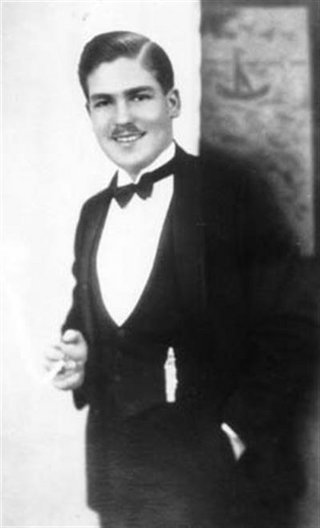Rudolf Kroyer

Personalia
Born:
Died:
Profession:
Persecution:
Imprisonment 25.03.1938 - 09.04.1938,
Released,
Imprisonment 26.02.1940 - 11.03.1940
Memberships
Curriculum Vitae
Rudolf Kroyer attends the Catholic parish school in Zemendorf, where Hungarian is still partly taught. He becomes a member of the "Reichsbund der katholisch-deutschen Jugend Österreichs". In 1925/26, he transferred to the humanistic grammar school in Eisenstadt. During his secondary school years, he became active in the Saxo-Teutonia secondary school fraternity in Vienna (now Merkenstein Berndorf) in 1929 and later in the Neuland youth association. He graduated in 1932 and became a primary school teacher.
As a teacher and organist at the Catholic parish school in Rust, he founded a local branch of the Vaterländische Front together with other interested parties. From 1934 to 1938, he worked at the Catholic parish school in Neutal in central Burgenland and as a member of the VF in the cultural organization "Neues Leben".
"Anyone who really knew me politically in Neutal between 1934 and 1938 knew about my very strong awareness of Austria."
Rudolf Kroyer describes the Anschluss as follows:
When Chancellor Schuschnigg's 'God save Austria' was heard on the radio, I suspected that my time as a teacher in Neutal was over. That very night, March 11-12, 1938, some illegal National Socialists brought me into the extra room of a Neutal inn to make me aware in front of a large swastika flag that a new era had dawned. ... On March 25, I went back to Neutal to find out what would happen to me as a teacher."
During the night of March 25 to 26, 1938, the "Black" was arrested by SA men: ("Get dressed, take some things for prison!") and taken to prison in Oberpullendorf. "At the district court in Oberpullendorf, young boys in SA uniforms, my former pupils, received me with the respect that a village teacher was naturally accorded at the time." They also saved him from the punishment of sweeping the street with the sentence: "Our teacher doesn't sweep the street, we'd rather stand in for him."
"One day, the vet from Draßmarkt, who was a well-known Nazi, drove up to the district court in Oberpullendorf and demanded that Kroyer wash his car. He wanted to humiliate me and show me: now we, the brown people, are the masters, and you, as a black vassal of the corporative state, are now at the bottom. Now the following happened. The guards there, SA people from Neutal, i.e. from my school community, said to the vet: 'Out of the question. Our teacher won't wash your car!'"
After 14 days, Rudolf Kroyer was released from custody and dismissed from the school service by the district school inspector without notice and without severance pay. To avoid further persecution, he then moved to Bremen in October 1938 to work as a commercial employee in a freight forwarding company. Because of a "defeatist statement against the Nazi regime" at the hairdresser's - observed by a Gestapo man - he was again taken into protective custody for 14 days on February 26, 1940, from which his "boss, a rich, respected Bremen freight forwarder, 'bought him out' through bribery". When Rudolf Kroyer was released from prison, he was given a lapel to sign, which threatened to send him to a concentration camp immediately if he repeated such derogatory political remarks without a court hearing, so he preferred to enlist in the Wehrmacht and go into hiding.
"I, the Austrian and one-man resistance fighter, joined the 'Prussians' voluntarily, out of political and other prudence."
He was deployed in France and was taken prisoner of war there in 1944. On May 17, 1946, he was able to return home in a cattle car and moved to Vienna as a secondary school teacher. He received his doctorate in 1956 and became a secondary school principal from 1959 to 1971. He became involved in the ÖVP Comradeship of the Politically Persecuted and Confessors for Austria and later became its deputy chairman.
From the homepage of the Documentation Center of Austrian Resistance (DÖW):
"In the days of upheaval, in March 1938, I was dismissed from the teaching profession and spent 14 days in so-called protective custody in Oberpullendorf. There must have been Nazis in the district who persecuted my actions and my attitude, my basic attitude. I was known in National Socialist circles as a patriot [...] And the school inspector said to me after my protective custody that if I converted and became a National Socialist, I could stay on as a teacher. But I replied: "I'm not a National Socialist, and I don't subscribe to this world view." To which he said: "Well, then we can't use you." [...]"
"There were many Jews from Kobersdorf in the Oberpullendorf prison with me. The Jews were already locked up. Also with me - in protective custody in Oberpullendorf - were Catholic priests, who were also consciously anti-Nazi, and some functionaries of the Patriotic Front."
Places
Residence:
Citations
Krause, Peter/Reinelt, Herbert/Schmitt, Helmut (2020): Farbe tragen, Farbe bekennen. Katholische Korporierte in Widerstand und Verfolgung. Teil 2. Kuhl, Manfred (ÖVfStG, Wien) S. 188/189.; Homepage des DÖW unter www.doew.at; Stand: 23.09.2022.; Photo: ÖCV
